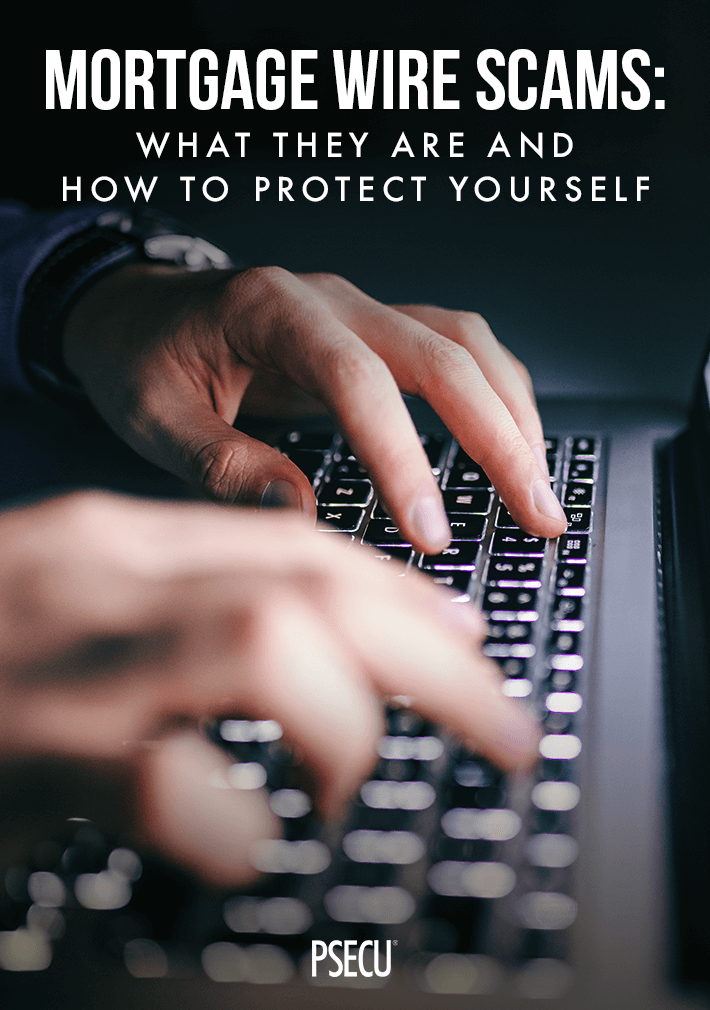If you’re in the market for a home, you’ve likely worked hard to build up a down payment. Fraudsters know this and look to identify potential homebuyers, as they’re hoping to get their hands on the cash you’ve saved up for a house.
One of the most common ways scammers trick homebuyers is through mortgage wire scams. Read on to learn what these scams are and how to spot them.
What is a Mortgage Wire Scam?
When you’re buying a home, you’ll eventually need to pay out the down payment you’ve saved up. The types of payment accepted for this may vary based on your unique situation, but it’s traditionally done by bringing a cashier’s check for the specified amount to your home closing meeting. This is when scammers often interfere.
Scammers will try to gain access to information about potential homebuyers and get them to send their down payment funds to a fraudulent account before they go to closing, typically via a wire transfer. Two common ways scammers gain access are listed below.
- Hacking into email accounts of trusted individuals – Scammers will try to hack accounts for settlement agencies or financial institutions and send emails to buyers with incorrect instructions to wire the money to a fraudulent account.
- Spoofing (impersonating) trusted individuals – Scammers who have gained access to individuals’ email accounts watch those accounts for emails indicating that person may be preparing to purchase a home. Once they identify the victim as a potential homebuyer, they’ll watch to see who they’re receiving communication from regarding the sale.
Fraudsters will then create a fake email address that mimics the legitimate email address of someone the buyer trusts in regards to the mortgage, such as the lender, real estate agent, or settlement company. Since they know that you’re busy and possibly overwhelmed as closing day approaches, they hope that you won’t notice the slight difference in the address, such as an additional letter or a slightly different email domain.
In either of these cases, if the buyer doesn’t identify the email as a scam, they’ll unintentionally, but willingly, hand their down payment over to the scammer. Unfortunately, in some cases, this money can’t be recovered, and the homebuyer is no longer able to purchase the home.

Tips to Protect Yourself from Mortgage Wire Scams
It can be unnerving to hear about these scams, especially if you’re preparing to purchase a home yourself. However, there are steps you can take to protect yourself so you can confidently move forward with your homebuying plans.
- Stay organized – Keep the contact information of important parties involved in your mortgage transaction in one place. If you’re unsure if an email is coming from the correct address, double check this list before replying.
- Don’t rush – Take your time when reading emails or any other communications regarding your mortgage. Pay close attention to the sender, as well as any logos or links included in the email. Before clicking on the link, hover your mouse over the hyperlink to see what web address it will direct you to. If it’s not a destination you trust, don’t click on the link.
- Know the process from the start – Make sure you know what to expect throughout the homebuying process and get clear instructions on the down payment process. Document the information in a place you can easily reference so you can catch if there’s a change in the directions.
- Call your contact directly – Before making any financial transaction related to your home purchase, make sure you contact your financial institution and/or trusted real estate agent directly to make sure the information you received is legitimate.
Knowing how to spot a mortgage wire scam can help you make your homebuying dreams a reality without the worry of a fraudster interfering. For more information on keeping yourself safe from scams, visit the Security section of our blog.
The content provided in this publication is for informational purposes only. Nothing stated is to be construed as financial or legal advice. Some products not offered by PSECU. PSECU does not endorse any third parties, including, but not limited to, referenced individuals, companies, organizations, products, blogs, or websites. PSECU does not warrant any advice provided by third parties. PSECU does not guarantee the accuracy or completeness of the information provided by third parties. PSECU recommends that you seek the advice of a qualified financial, tax, legal, or other professional if you have questions.
